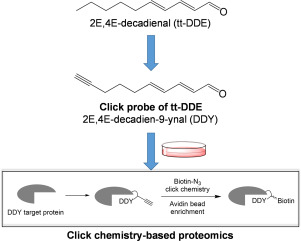The Journal of Nutritional Biochemistry ( IF 4.8 ) Pub Date : 2019-11-13 , DOI: 10.1016/j.jnutbio.2019.108286 Yuxin Wang 1 , Devon A Dattmore 2 , Weicang Wang 3 , Georg Pohnert 4 , Stefanie Wolfram 4 , Jianan Zhang 3 , Ran Yang 3 , Eric A Decker 3 , Kin Sing Stephen Lee 2 , Guodong Zhang 5

|
Peroxidation of polyunsaturated fatty acids leads to the formation of a large array of lipid-derived electrophiles (LDEs), many of which are important signaling molecules involved in the pathogenesis of human diseases. Previous research has shown that one of such LDEs, trans, trans-2,4-decadienal (tt-DDE), increases inflammation, however, the underlying mechanisms are not well understood. Here we used click chemistry-based proteomics to identify the cellular targets which are required for the pro-inflammatory effects of tt-DDE. We found that treatment with tt-DDE increased cytokine production, JNK phosphorylation, and activation of NF-κB signaling in macrophage cells, and increased severity of dextran sulfate sodium (DSS)-induced colonic inflammation in mice, demonstrating its pro-inflammatory effects in vitro and in vivo. Using click chemistry-based proteomics, we found that tt-DDE directly interacts with Hsp90 and 14–3-3ζ, which are two important proteins involved in inflammation and tumorigenesis. Furthermore, siRNA knockdown of Hsp90 or 14–3-3ζ abolished the pro-inflammatory effects of tt-DDE in macrophage cells. Together, our results support that tt-DDE increases inflammatory responses via Hsp90- and 14–3-3ζ-dependent mechanisms.
中文翻译:

脂质过氧化产物反式,反式-2,4-癸二醛通过Hsp90或14-3-3ζ依赖性机制诱导炎症反应。
多不饱和脂肪酸的过氧化作用导致形成大量脂质衍生的亲电试剂(LDE),其中许多是涉及人类疾病发病机理的重要信号分子。先前的研究表明,这样的LDE之一,反式,反式-2,4-癸二醛(tt-DDE)会增加炎症,但是,其潜在机制尚未得到很好的理解。在这里,我们使用基于点击化学的蛋白质组学来鉴定tt-DDE促炎作用所需的细胞靶标。我们发现用tt-DDE处理可增加细胞因子的产生,JNK磷酸化和巨噬细胞中NF-κB信号的激活,并增加了葡聚糖硫酸钠(DSS)诱导的小鼠结肠炎症的严重性,表明其促炎作用体外和体内。使用基于点击化学的蛋白质组学,我们发现tt-DDE与Hsp90和14-3-3ζ直接相互作用,Hsp90和14-3-3ζ是与炎症和肿瘤发生有关的两个重要蛋白质。此外,Hsp90或14-3-3ζ的siRNA敲除消除了tt-DDE对巨噬细胞的促炎作用。总之,我们的结果支持tt-DDE通过Hsp90和14-3-3ζ依赖性机制增强炎症反应。











































 京公网安备 11010802027423号
京公网安备 11010802027423号